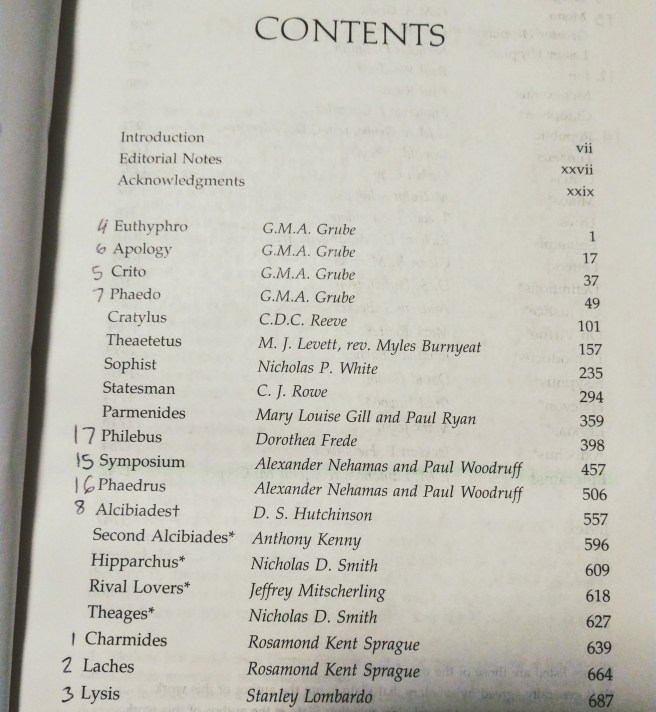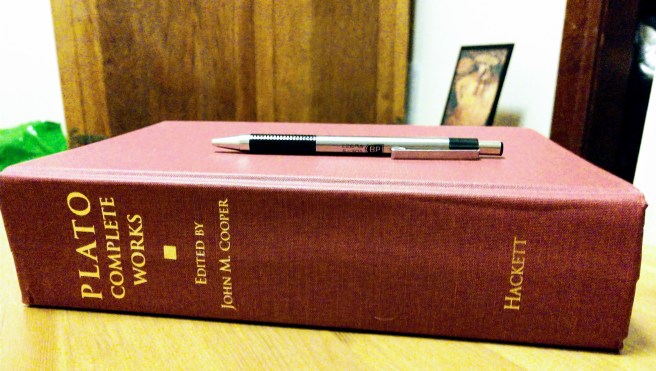The first time I read Euthyphro, I downloaded the LibreVox audiobook, loaded it onto my old LG Touch, and went out on the trail near my mom’s house for a walk. That walk taught me one thing — namely, that regardless of whether something is called a dialogue, philosophy is best when read. It’s hard to linger over passages and weigh words against one another when voices are as permanent as sand trickling through an hourglass. (I’m good at recalling lectures and actual conversations, though.)
For me, the ideal time to read intellectually heavy matters comes after working out, when my body is pumped and alert and my mind no longer feels a haze of restlessness.
I re-read Euthyphro this weekend on the sunny front room couch of my new apartment, coffee resting by my side. My new apartment is laid out in a way that encourages me to read, write, and produce things actively. It has shrines just so, along with a steady stream of light throughout the day.


From there, I went to the English Lexicon of Standard Terminology for Hellenismos to see the definitions of eulabeia and eusebeia again. I find this helpful because it provides compare/contrast modes of thinking from different philosophical schools (i.e., the Stoics), and even though I know what piety means, it helps to have the words that can be translated as such laid out in front of me.
I’m a lateral reader unless I’m reading fiction. As an extrovert, it’s a good proxy for people about 90% of the time, as I need to decompress from what I read with others, but know that it’s bothersome. I went to Google to see what others had written about Euthyphro. To avoid note summaries for students and online versions of the text itself, I typed Euthyphro polytheism.
It’s mostly people talking about how Euthyphro proves that polytheism is not as good as monotheism, that you cannot have piety in a polytheistic system, and that polytheism gives way to monotheism under any scrutiny. Not all. Just mostly.
There’s a lot of room to be angry about things like that. It’s a sloppy projection, for one, because the scenario has a complex backdrop in a culture. On the other hand, we have the English Lexicon, and we have the philosophers themselves, regardless of how good the translations are.
I read two other dialogues this weekend, and it’s definitely part of a systematic approach. On 13 August 2009, Apuleius Platonicus wrote “Plato for Pagans,” which went into how he would approach commentaries on Plato as a pagan philosopher. I saved the order of the dialogues he presented because I was genuinely curious to know what it would be like to read the dialogues in that order.

You see that A.P. posted the sequence ~9 years ago. I’ve intended to do this daisy chain thing every year since reading it. The image above is my marked Complete Works.
And what has happened since 2009? I went to graduate school. I moved for my job. I got caught up in the things that one does, especially social media.
I escaped (most) social media in late 2016, and I’ve been moving towards doing the bare minimum ever since. Applying mindfulness techniques to social media, incidentally, is an exceedingly stark experience because one realizes just how much miasma one picks up from it. On the plus side, I am reclaiming hour after hour.
So I’m now reading in that sequence.


At least my article “Polytheism and the Euthyphro” comes up on the first page of results. I suppose that putting the full text online might nudge it a little higher. Not that it’s anything like the last word on the subject, but it’s a start. Otherwise McPherran’s written the best that I’ve read on the dialogue. It’s curious how much more important the Euthyphro is to how Plato is taught today, compared to antiquity; which is not to say that the “Euthyphro problem”, properly understood, is not key to a good deal of ancient philosophy, especially by Platonists, but this problem was not primarily thought through that dialogue. Something similar has occurred in modernity with the Republic: these dialogues answer to particular modern ideological configurations that were not so salient in antiquity.
LikeLiked by 2 people
I literally just bought the issue it was in so I could read your article. 😆
I tend to think of piety as an affirmation of the social contract between a god and (a) person(s)/society through behavior/honors/devotion, which is partially why I went back to the translated YSEE definitions (to check myself). But in reflecting on that and the dialogue, I know that part of the way I think about piety is informed by the existence of this dialogue even though I’m not thinking directly about the dialogues at all times.
LikeLiked by 2 people
That’s very nice of you. I should say that while I don’t post my articles from Walking the Worlds on the web, because I don’t want to undercut the journal, I do honor requests for copies.
The key for me to the Euthyphro is that there isn’t any simple answer to the problem; rather, it opens up a rich field for thinking about all kinds of issues in religion, and helps us to recognize what we hold true prereflectively about the relationship between the Gods and their worshipers. It’s surprising to me how many modern interpreters read this dialogue as though Plato has a simple solution up his sleeve, and is just being coy about revealing it. That’s a very strange hermeneutic. Far better in my opinion is the traditional approach of the Platonic schools in later antiquity, which see the positions sequentially affirmed and then rejected in the elenchus as each of them truths in a wider or narrower scope.
LikeLiked by 2 people
Okay, so I’ve used my half-snow day to read McPherran’s “Socratic Piety in the Euthyphro,” which I found interesting and helpful.
Specifically, I’ve been listening to the Secret History of Western Esotericism podcast, and I just finished listening to the interview with Wouter Hanegraaff, which provides Hanegraaff’s overview of the undercurrents of Platonic thought in the West after the Dark Ages began, including the Reformation/Enlightenment backlash against the more “woo” aspects of Plato; the subsequent separation of philosophy into true and false philosophy; and the like. I can definitely see echoes of that in the conversation McPherran is part of, and I’m happy that I encountered these two scholars’ work more or less at the same time.
LikeLiked by 2 people